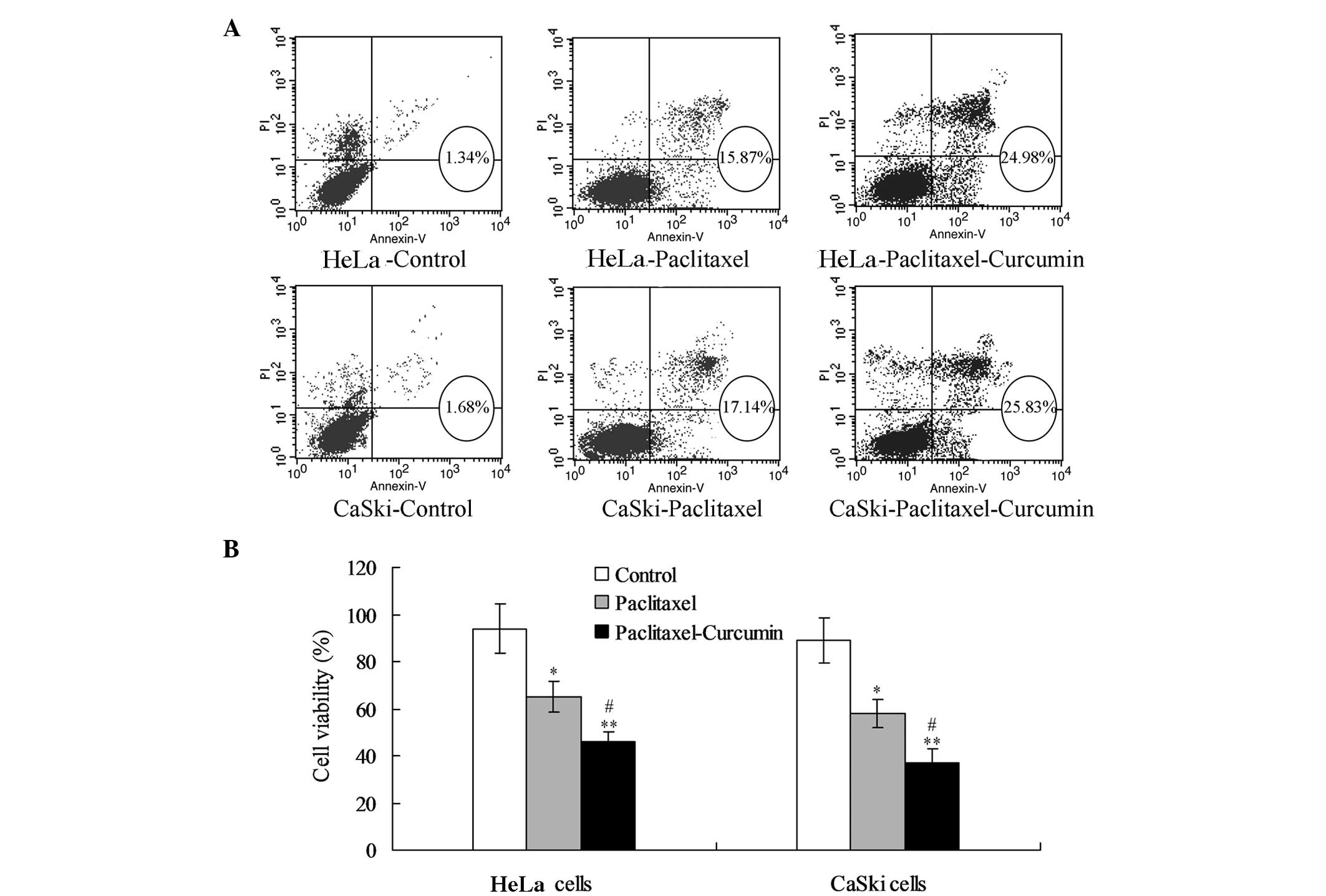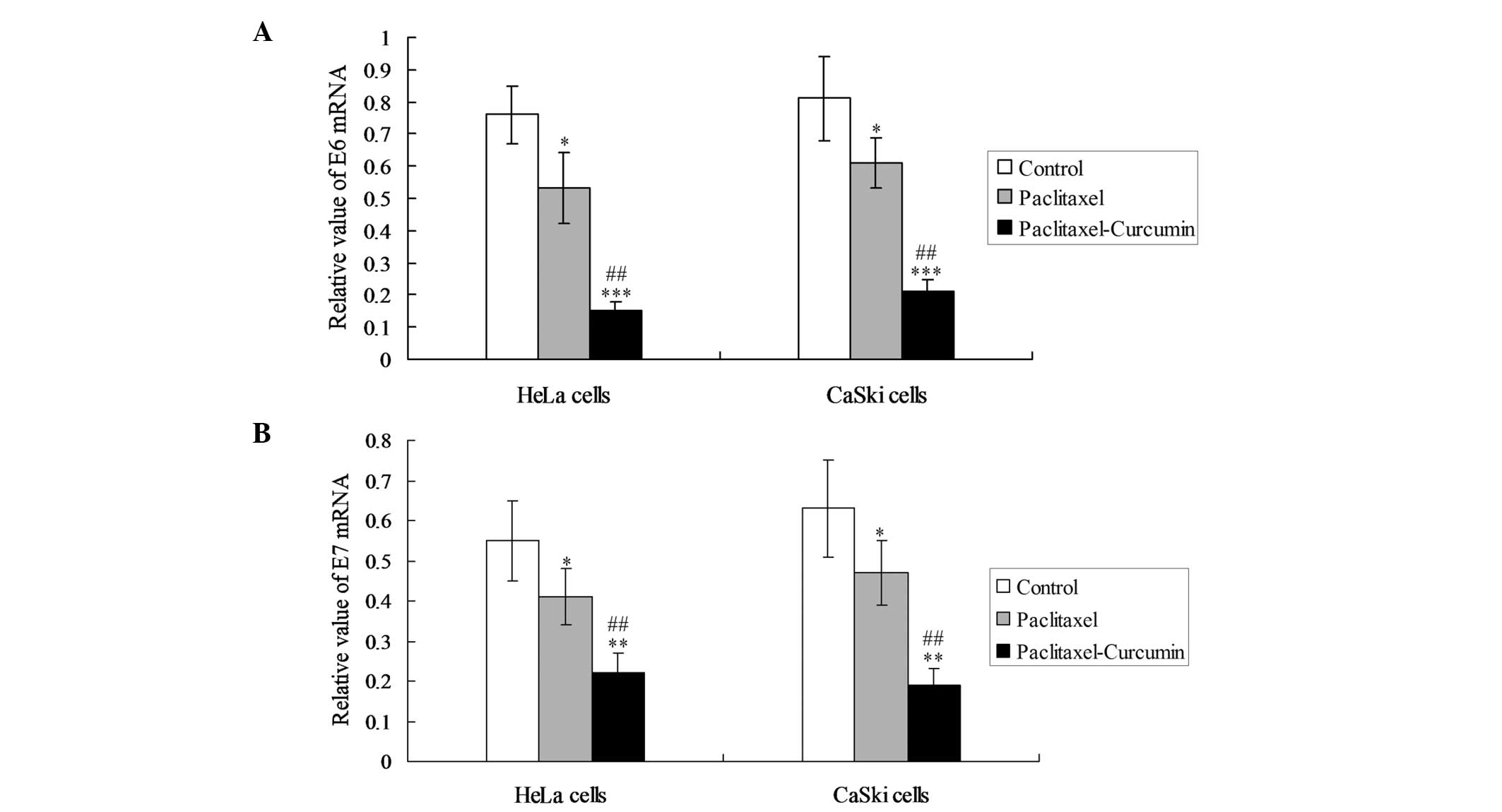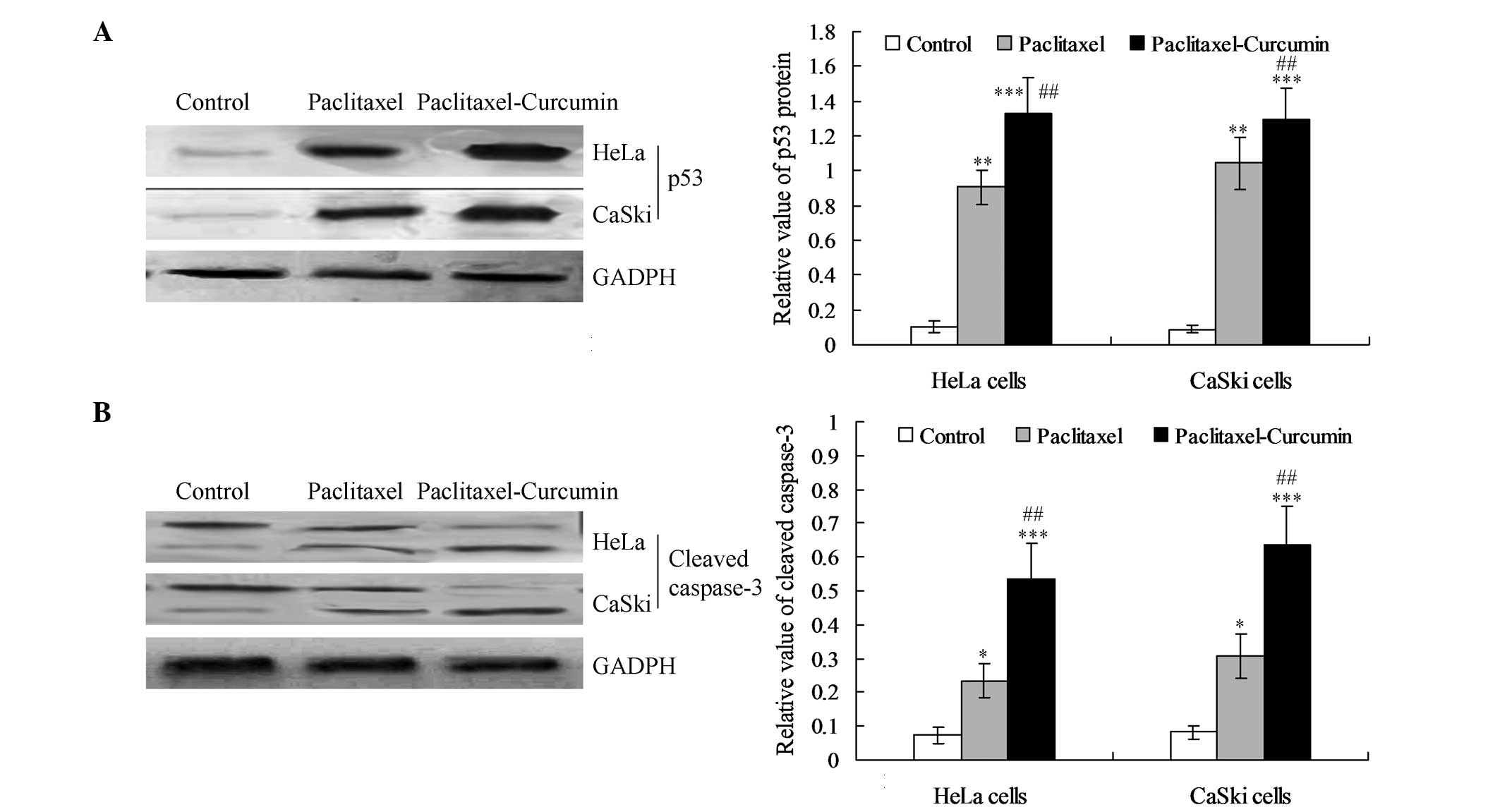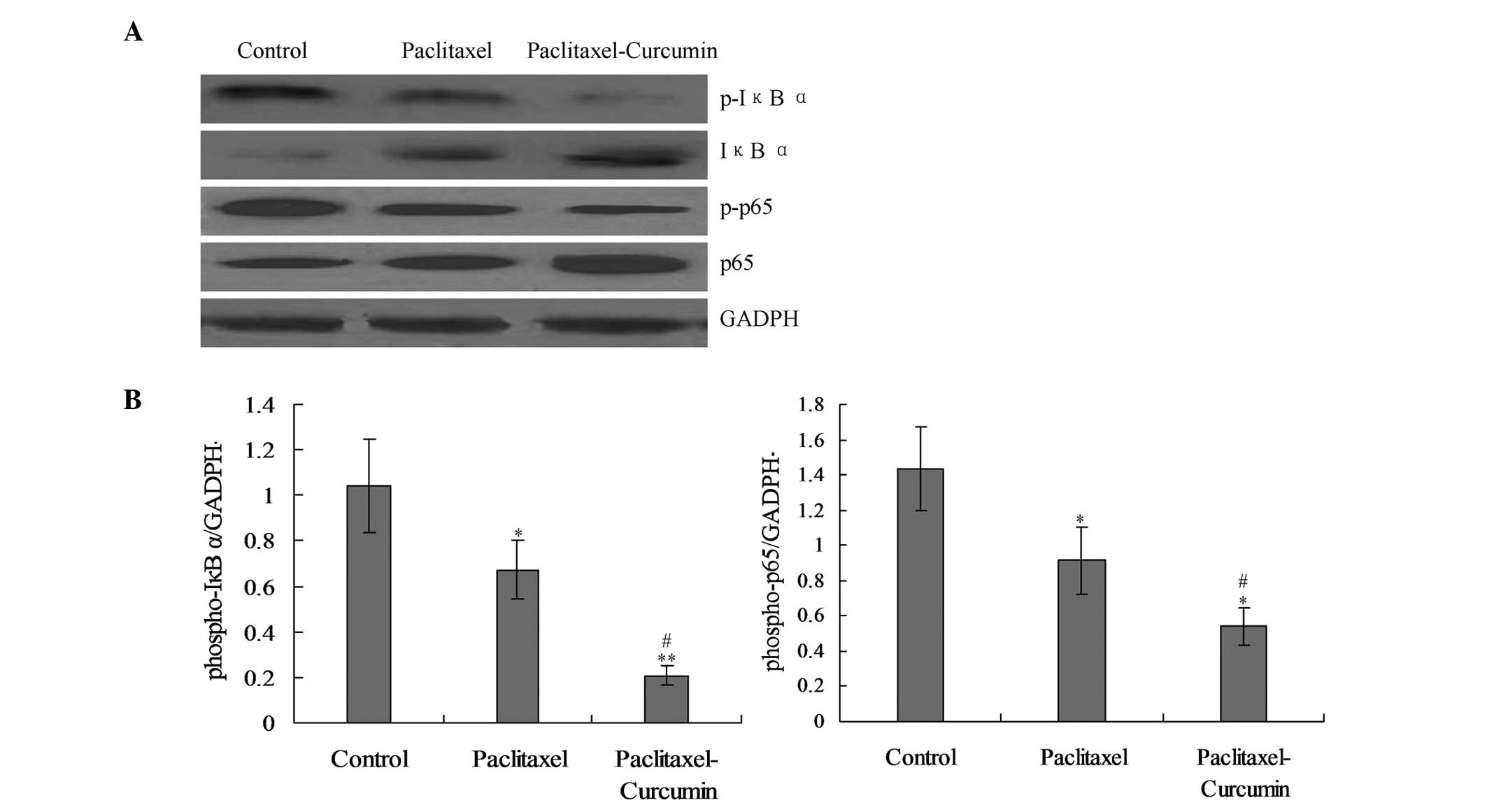|
1
|
Bian ML, Cheng JY, Ma L, Cong X, Liu J,
Chen Y and Chen X: Evaluation of the detection of 14 high-risk
human papillomaviruses with HPV 16 and HPV 18 genotyping for
cervical cancer screening. Exp Ther Med. 6:1332–1336.
2013.PubMed/NCBI
|
|
2
|
Chao A, Lin CT and Lai CH: Updates in
systemic treatment for metastatic cervical cancer. Curr Treat
Option Oncol. 15:1–13. 2014. View Article : Google Scholar
|
|
3
|
Lu X, Wu L, Liu Z, Xie L and Wang S:
Peripheral blood mononuclear cells inhibit proliferation and
promote apoptosis of HeLa cells following stimulation with Bacillus
Calmette-Guerin. Exp Ther Med. 5:561–566. 2013.PubMed/NCBI
|
|
4
|
Distefano M, Fagotti A, Ferrandina G,
Fanfani F, Smaniotto D, D’Agostino G, Morganti A and Scambia G:
Preoperative chemoradiotherapy in locally advanced cervical cancer:
long-term outcome and complications. Gynecol Oncol. 99(3 Suppl 1):
S166–S170. 2005. View Article : Google Scholar
|
|
5
|
Kjellström J, Oredsson SM and Wennerberg
J: Increased toxicity of a trinuclear Pt-compound in a human
squamous carcinoma cell line by polyamine depletion. Cancer Cell
Int. 12:202012. View Article : Google Scholar : PubMed/NCBI
|
|
6
|
Kanamori Y, Kigawa J, Minagawa Y, Irie T,
Itamochi H, Cheng X, Okada M and Terakawa N: Clinical responses and
platinum concentrations in tumors after intra-arterial and
intravenous administration of cisplatin in the same patients with
cervical cancer. Gynecol Obstet Invest. 44:57–60. 1997. View Article : Google Scholar : PubMed/NCBI
|
|
7
|
Sun XY, Zheng YP, Lin DH, Zhang H, Zhao F
and Yuan CS: Potential anti-cancer activities of furanodiene, a
sesquiterpene from Curcuma wenyujin. Am J Chin Med. 37:589–596.
2009. View Article : Google Scholar : PubMed/NCBI
|
|
8
|
Grundmann O, Fillinger JL, Victory KR,
Burd R and Limesand KH: Restoration of radiation therapy-induced
salivary gland dysfunction in mice by post therapy IGF-1
administration. BMC cancer. 10:4172010. View Article : Google Scholar : PubMed/NCBI
|
|
9
|
Termrungruanglert W, Kudelka AP,
Piamsomboon S, Edwards CL, Verschraegen CF, Loyer E and Kavanagh
JJ: Remission of recurrent cervical cancer with paclitaxel and
carboplatin: a case report and review of literature. Eur J Gynaecol
Oncol. 17:493–496. 1996.PubMed/NCBI
|
|
10
|
Zanetta G, Fei F and Mangioni C:
Chemotherapy with paclitaxel, ifosfamide, and cisplatin for the
treatment of squamous cell cervical cancer: the experience of
Monza. Semin Oncol. 27:23–27. 2000.PubMed/NCBI
|
|
11
|
Braicu EI, Fotopoulou C, Chekerov R,
Richter R, Blohmer J, Kummel S, Stamatian F, Yalcinkaya I, Mentze
M, Lichtenegger W and Sehouli J: Role of serum concentration of
VEGFR1 and TIMP2 on clinical outcome in primary cervical cancer:
results of a companion protocol of the randomized, NOGGO-AGO phase
III adjuvant trial of simultaneous cisplatin-based
radiochemotherapy vs. carboplatin and paclitaxel containing
sequential radiotherapy. Cytokine. 61:755–758. 2013. View Article : Google Scholar : PubMed/NCBI
|
|
12
|
Sreekanth CN, Bava SV, Sreekumar E and
Anto RJ: Molecular evidences for the chemosensitizing efficacy of
liposomal curcumin in paclitaxel chemotherapy in mouse models of
cervical cancer. Oncogene. 30:3139–3152. 2011. View Article : Google Scholar : PubMed/NCBI
|
|
13
|
Lee KH, Yim EK, Kim SJ, Namkoong SE, Um SJ
and Park JS: Proteomic analysis of anti-cancer effects by
paclitaxel treatment in cervical cancer cells. Gynecol Oncol.
98:45–53. 2005. View Article : Google Scholar : PubMed/NCBI
|
|
14
|
Park DC, Yeo SG, Shin EY, Mok SC and Kim
DH: Clusterin confers paclitaxel resistance in cervical cancer.
Gynecol Oncol. 103:996–1000. 2006. View Article : Google Scholar : PubMed/NCBI
|
|
15
|
Kuo DY, Blank SV, Christos PJ, Kim M,
Caputo TA, Pothuri B, Hershman D, Goldman N, Ivy PS, Runowicz CD,
Muggia F, Goldberg GL and Einstein MH: Paclitaxel plus oxaliplatin
for recurrent or metastatic cervical cancer: a New York Cancer
Consortium Study. Gynecol Oncol. 116:442–446. 2010. View Article : Google Scholar :
|
|
16
|
Saito I, Kitagawa R, Fukuda H, Shibata T,
Katsumata N, Konishi I, Yoshikawa H and Kamura T: A phase III trial
of paclitaxel plus carboplatin versus paclitaxel plus cisplatin in
stage IVB, persistent or recurrent cervical cancer: Gynecologic
cancer study group/Japan clinical oncology group study (JCOG0505).
Jpn J Clin Oncol. 40:90–93. 2010. View Article : Google Scholar
|
|
17
|
Kosmas C, Mylonakis N, Tsakonas G, Vorgias
G, Karvounis N, Tsavaris N, Daladimos T, Kalinoglou N, Malamos N,
Akrivos T and Karabelis A: Evaluation of the
paclitaxel-ifosfamide-cisplatin (TIP) combination in relapsed
and/or metastatic cervical cancer. Br J Cancer. 101:1059–1065.
2009. View Article : Google Scholar : PubMed/NCBI
|
|
18
|
Moore KN, Herzog TJ, Lewin S, Giuntoli RL,
Armstrong DK, Rocconi RP, Spannuth WA and Gold MA: A comparison of
cisplatin/paclitaxel and carboplatin/paclitaxel in stage IVB,
recurrent or persistent cervical cancer. Gynecol Oncol.
105:299–303. 2007. View Article : Google Scholar : PubMed/NCBI
|
|
19
|
Karaman M, Firinci F, Cilaker S, Uysal P,
Tugyan K, Yilmaz O, Uzuner N and Karaman O: Anti-inflammatory
effects of curcumin in a murine model of chronic asthma. Allergol
Immunopathol (Madr). 40:210–214. 2012. View Article : Google Scholar
|
|
20
|
Jacob JN, Badyal DK, Bala S and Toloue M:
Evaluation of the in vivo anti-inflammatory and analgesic and in
vitro anti-cancer activities of curcumin and its derivatives. Nat
Prod Commun. 8:359–362. 2013.PubMed/NCBI
|
|
21
|
Sreenivasan S and Krishnakumar S:
Synthestic effect of curcumin in combination with Anticancer agents
in human retinoblastoma cancer cells lines. Curr Eye Res. 11:1–13.
2014. View Article : Google Scholar
|
|
22
|
Basnet P and Skalko-Basnet N: Curcumin: an
anti-inflammatory molecule from a curry spice on the path to cancer
treatment. Molecules. 16:4567–4598. 2011. View Article : Google Scholar : PubMed/NCBI
|
|
23
|
Bava SV, Sreekanth CN, Thulasidasan AK,
Anto NP, Cheriyan VT, Puliyappadamba VT, Menon SG, Ravichandran SD
and Anto RJ: Akt is upstream and MAPKs are downstream of NF-kappaB
in paclitaxel-induced survival signaling events, which are
down-regulated by curcumin contributing to their synergism. Int J
Biochem Cell Biol. 43:331–341. 2011. View Article : Google Scholar
|
|
24
|
Hossain M, Banik NL and Ray SK:
Synergistic anti-cancer mechanisms of curcumin and paclitaxel for
growth inhibition of human brain tumor stem cells and LN18 and
U138MG cells. Neurochem Int. 61:1102–1113. 2012. View Article : Google Scholar : PubMed/NCBI
|
|
25
|
Bava SV, Puliappadamba VT, Deepti A, Nair
A, Karunagaran D and Anto RJ: Sensitization of taxol-induced
apoptosis by curcumin involves down-regulation of nuclear
factor-kappaB and the serine/threonine kinase Akt and is
independent of tubulin polymerization. J Biol Chem. 280:6301–6308.
2005. View Article : Google Scholar
|
|
26
|
Boztas AO, Karakuzu O, Galante G, Ugur Z,
Kocabas F, Altuntas CZ and Yazaydin AO: Synergistic interaction of
paclitaxel and curcumin with cyclodextrin polymer complexation in
human cancer cells. Mol Pharm. 10:2676–2683. 2013. View Article : Google Scholar : PubMed/NCBI
|
|
27
|
Brem GJ, Mylonas I and Brüning A:
Eeyarestatin causes cervical cancer cell sensitization to
bortezomib treatment by augmenting ER stress and CHOP expression.
Gynecol Oncol. 128:383–390. 2013. View Article : Google Scholar
|
|
28
|
Skiles ML, Sahai S and Blanchette JO:
Tracking hypoxic signaling within encapsulated cell aggregates. J
Vis Exp. 58:35212011.
|
|
29
|
Li GL, Jiang W, Xia Q, Chen SH, Ge XR, Gui
SQ and Xu CJ: HPV E6 down-regulation and apoptosis induction of
human cervical cancer cells by a novel lipid-soluble extract (PE)
from Pinellia pedatisecta Schott in vitro. J Ethnopharmacol.
132:56–64. 2010. View Article : Google Scholar : PubMed/NCBI
|
|
30
|
Jackson R, Togtema M and Zehbe I:
Subcellular localization and quantitation of the human
papillomavirus type 16 E6 oncoprotein through immunocytochemistry
detection. Virology. 435:425–432. 2013. View Article : Google Scholar
|
|
31
|
Arroyo M, Bagchi S and Raychaudhuri P:
Association of the human papillomavirus type 16 E7 protein with the
S-phase-specific E2F-cyclin A complex. Mol Cell Biol. 13:6537–6546.
1993.PubMed/NCBI
|
|
32
|
Goel A and Aggarwal BB: Curcumin, the
golden spice from Indian saffron, is a chemosensitizer and
radiosensitizer for tumors and chemoprotector and radioprotector
for normal organs. Nutr Cancer. 62:919–930. 2010. View Article : Google Scholar : PubMed/NCBI
|
|
33
|
Tan S, de Vries EG, van der Zee AG and de
Jong S: Anticancer drugs aimed at E6 and E7 activity in
HPV-positive cervical cancer. Curr Cancer Drug Targets. 12:170–184.
2012. View Article : Google Scholar
|
|
34
|
Kim MS, Bak Y, Park YS, Lee DH, Kim JH,
Kang JW, Song HH, Oh SR and Yoon DY: Wogonin induces apoptosis by
suppressing E6 and E7 expressions and activating intrinsic
signaling pathways in HPV-16 cervical cancer cells. Cell Biol
Toxicol. 29:259–272. 2013. View Article : Google Scholar : PubMed/NCBI
|
|
35
|
Zhou J, Li B, Peng C, Wang F, Fu Z, Zhou
C, Hong D, Ye F, Lü W and Xie X: Inhibition of cervical cancer cell
growth in vitro and in vivo by lentiviral-vector mediated shRNA
targeting the common promoter of HPV16 E6 and E7 oncogenes.
Antiviral Res. 98:305–313. 2013. View Article : Google Scholar : PubMed/NCBI
|
|
36
|
Teissier S, Ben Khalifa Y, Mori M, Pautier
P, Desaintes C and Thierry F: A new E6/P63 pathway, together with a
strong E7/E2F mitotic pathway, modulates the transcriptome in
cervical cancer cells. J Virol. 81:9368–9376. 2007. View Article : Google Scholar : PubMed/NCBI
|
|
37
|
Chiu TH, Lan KY, Yang MD, Lin JJ, Hsia TC,
Wu CT, Yang JS, Chueh FS and Chung JG: Diallyl sulfide promotes
cell-cycle arrest through the p53 expression and triggers induction
of apoptosis via caspase- and mitochondria-dependent signaling
pathways in human cervical cancer Ca Ski cells. Nutr Cancer.
65:505–514. 2013. View Article : Google Scholar : PubMed/NCBI
|
|
38
|
Zhou X, Gu Y and Zhang SL: Association
between p53 codon 72 polymorphism and cervical cancer risk among
Asians: a HuGE review and meta-analysis. Asian Pac J Cancer Prev.
13:4909–4914. 2012. View Article : Google Scholar : PubMed/NCBI
|
|
39
|
Vidya Priyadarsini R, Senthil Murugan R,
Maitreyi S, Ramalingam K, Karunagaran D and Nagini S: The flavonoid
quercetin induces cell cycle arrest and mitochondria-mediated
apoptosis in human cervical cancer (HeLa) cells through p53
induction and NF-κB inhibition. Eur J Pharmacol. 649:84–91. 2010.
View Article : Google Scholar : PubMed/NCBI
|
|
40
|
Habbous S, Pang V, Eng L, Xu W, Kurtz G,
Liu FF, Mackay H, Amir E and Liu G: p53 Arg72Pro polymorphism, HPV
status and initiation, progression, and development of cervical
cancer: a systematic review and meta-analysis. Clin Cancer Res.
18:6407–6415. 2012. View Article : Google Scholar : PubMed/NCBI
|
|
41
|
Shi M, Du L, Liu D, Qian L, Hu M, Yu M,
Yang Z, Zhao M, Chen C, Guo L, Wang L, Song L, Ma Y and Guo N:
Glucocorticoid regulation of a novel HPV-E6-p53-miR-145 pathway
modulates invasion and therapy resistance of cervical cancer cells.
J Pathol. 228:148–157. 2012. View Article : Google Scholar : PubMed/NCBI
|
|
42
|
Ristriani T, Fournane S, Orfanoudakis G,
Travé G and Masson M: A single-codon mutation converts HPV16 E6
oncoprotein into a potential tumor suppressor, which induces
p53-dependent senescence of HPV-positive HeLa cervical cancer
cells. Oncogene. 28:762–772. 2009. View Article : Google Scholar
|
|
43
|
Fiedler M, Müller-Holzner E, Viertler HP,
Widschwendter A, Laich A, Pfister G, Spoden GA, Jansen-Dürr P and
Zwerschke W: High level HPV-16 E7 oncoprotein expression correlates
with reduced pRb-levels in cervical biopsies. FASEB J.
18:1120–1122. 2004.PubMed/NCBI
|
|
44
|
Loignon M and Drobetsky EA: The initiation
of UV-induced G(1) arrest in human cells is independent of the
p53/p21/pRb pathway but can be attenuated through expression of the
HPV E7 oncoprotein. Carcinogenesis. 23:35–45. 2002. View Article : Google Scholar : PubMed/NCBI
|
|
45
|
Hu T, Ferril S, Snider A and Barbosa M:
In-vivo analysis of HPV E7 protein association with pRb, p107 and
p130. Int J Oncol. 6:167–174. 1995.PubMed/NCBI
|
|
46
|
Liu WL, Green N, Seymour LW and Stevenson
M: Paclitaxel combined with siRNA targeting HPV16 oncogenes
improves cytotoxicity for cervical carcinoma. Cancer Gene Ther.
16:764–775. 2009. View Article : Google Scholar : PubMed/NCBI
|
|
47
|
Johnson RF and Perkins ND: Nuclear
factor-kappaB, p53, and mitochondria: regulation of cellular
metabolism and the Warburg effect. Trends Biochem Sci. 37:317–324.
2012. View Article : Google Scholar : PubMed/NCBI
|
|
48
|
Sun Y, Holley AK and St Clair DK: p53
regulation of energy metabolism and mitochondria regulation of p53
in cancer cells: an insight into the role of manganese superoxide
dismutase. Curr Pharm Biotechnol. 14:261–273. 2013. View Article : Google Scholar
|
|
49
|
Galluzzi L, Morselli E, Kepp O, Tajeddine
N and Kroemer G: Targeting p53 to mitochondria for cancer therapy.
Cell Cycle. 7:1949–1955. 2008. View Article : Google Scholar : PubMed/NCBI
|
|
50
|
Yim EK, Tong SY, Ho EM, Bae JH, Um SJ and
Park JS: Anticancer effects on TACC3 by treatment of paclitaxel in
HPV-18 positive cervical carcinoma cells. Oncol Rep. 21:549–557.
2009.PubMed/NCBI
|
|
51
|
Prasad S, Ravindran J and Aggarwal BB:
NF-kappaB and cancer: how intimate is this relationship. Mol Cell
Biochem. 336:25–37. 2010. View Article : Google Scholar
|
|
52
|
Ferris RL and Grandis JR: NF-kappaB gene
signatures and p53 mutations in head and neck squamous cell
carcinoma. Clin Cancer Res. 13:5663–5664. 2007. View Article : Google Scholar : PubMed/NCBI
|
|
53
|
Sen T, Dutta A and Chatterjee A:
Epigallocatechin-3-gallate (EGCG) downregulates-B (MMP-9) by
involvement of FAK/ERK/NFkappa B and AP-1 in the human breast
cancer cell line MDA-MB-231. Anticancer Drug. 21:632–644. 2010.
View Article : Google Scholar
|


















